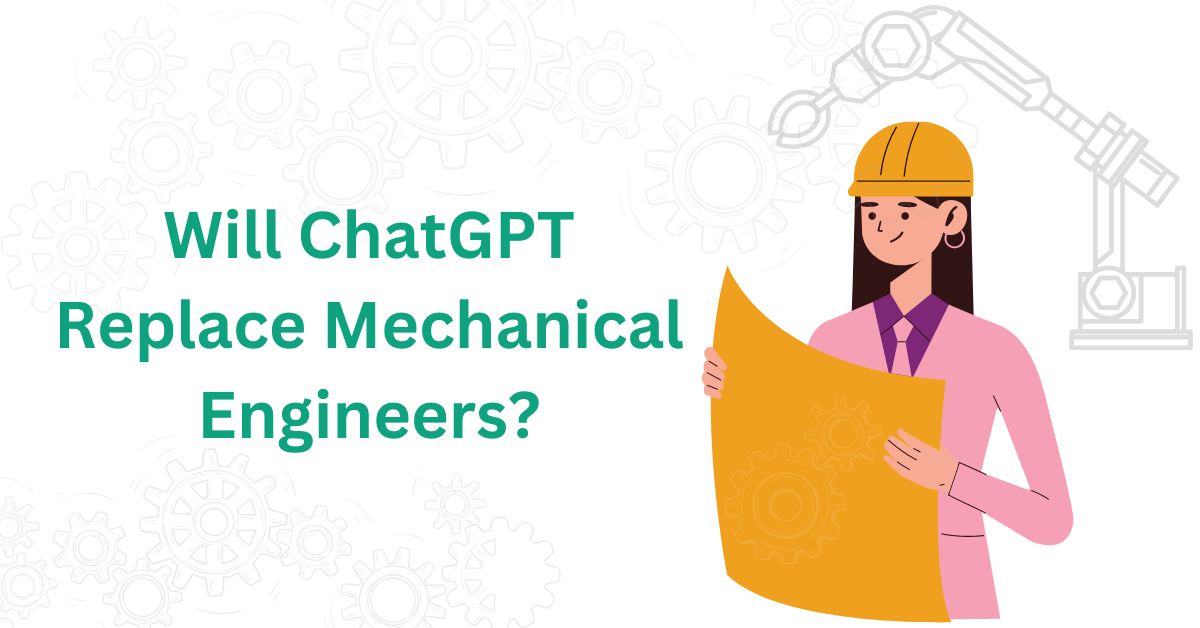
Mechanical engineering seems to be a practical job, and ChatGPT has nothing to do with it. However, ChatGPT has evolved and helped Mechanical Engineers pave the documentation.
Well, let’s dive into the further facts. Will ChatGPT replace mechanical engineers?
ChatGPT is not here to replace anyone. Instead, it assists and collaborates with mechanical engineers, complementing their skills and knowledge. There’s a lot of exciting potential for collaboration between AI and mechanical engineers, which could lead to groundbreaking innovations and advancements.
So, let’s explore the possibilities and discover how ChatGPT and mechanical engineers can work hand in hand to create a brighter future.
What is the Future of Mechanical Engineering With ChatGPT?
The future of mechanical engineering is incredibly exciting, even in the age of ChatGPT and other AI language models.
While it’s true that AI has the potential to automate certain aspects of mechanical engineering, it’s important to remember that there will always be a need for human expertise in the field.
Mechanical engineers possess unique skills and knowledge that AI cannot fully replicate, such as creativity, intuition, and the ability to think outside the box. In fact, AI can actually enhance the work of mechanical engineers by streamlining processes, improving accuracy, and increasing efficiency.
For example, ChatGPT can help engineers optimize designs, simulate complex systems, and perform data analysis at a scale that would be impossible for humans alone. Let’s have a look at what GPT has to say about this:
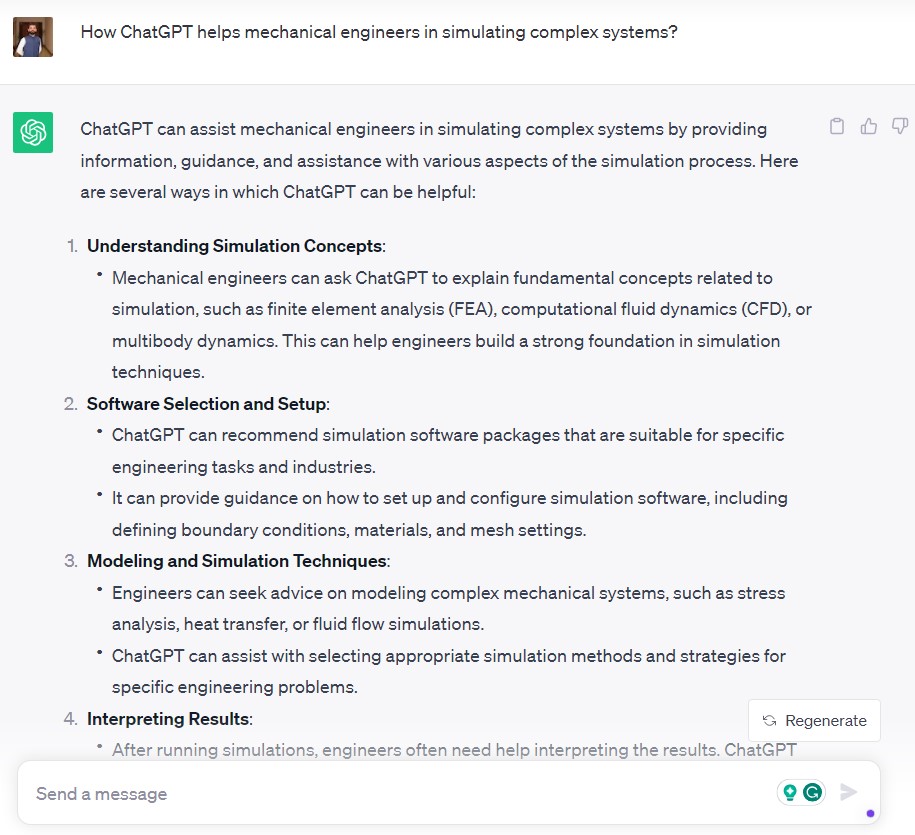
By working together, AI and mechanical engineers can create innovative solutions that address some of the world’s most pressing challenges, such as climate change, renewable energy, and sustainable infrastructure.
So, the future of mechanical engineering is bright, and AI like ChatGPT can play a valuable role in advancing the field. As technology continues to evolve, we can expect to see new opportunities emerge for collaboration and innovation between humans and machines.
Can ChatGPT Replace Mechanical Engineers?
Can ChatGPT replace mechanical engineers? While AI has certainly advanced in recent years, the answer is not as straightforward as a simple yes or no.
AI can automate aspects of mechanical engineering, such as design optimization, simulation, and data analysis. However, there are several key reasons why AI cannot completely replace mechanical engineers:
Creativity and Innovation
One of the primary reasons why mechanical engineers are invaluable is their ability to think creatively and innovate new solutions.
While AI can generate multiple design options, it cannot match the creativity and intuition of human engineers. For example, an engineer may be able to identify a novel solution to a design challenge that a machine simply cannot envision.
Complexity and Adaptability
Mechanical engineers are trained to design complex systems that adapt to changing environments and requirements. AI can certainly assist with simulation and optimization, but it cannot match the versatility of human engineers when it comes to adapting to unforeseen circumstances.
Additionally, mechanical engineers can troubleshoot and diagnose issues that may arise during a project, utilizing their expertise to overcome challenges that ChatGPT cannot handle, which is also admitted by itself. However, ChatGPT will list down some steps:
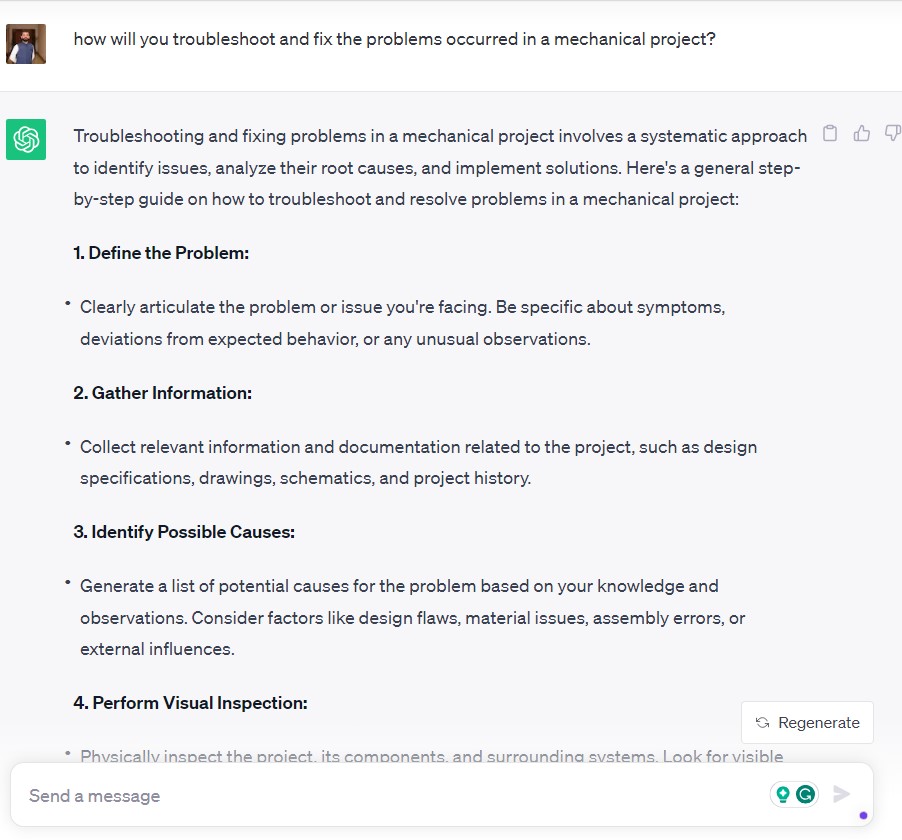
Communication and Collaboration
Finally, mechanical engineers often work collaboratively in teams to achieve project goals. Effective communication and collaboration are essential to success in mechanical engineering, as engineers must balance competing requirements and ensure that designs meet all necessary specifications.
While ChatGPT certainly assists with data analysis and communication, it cannot match the effectiveness of human teamwork.
How Mechanical Engineers Can Benefit from ChatGPT?
While AI may not be able to replace mechanical engineers fully, there are several examples of how AI can assist and enhance the work of mechanical engineers:
Design Optimization
One of the primary benefits of working with AI like ChatGPT is design optimization. AI can analyze vast amounts of data and simulate multiple design options, allowing engineers to identify the best options for a given set of criteria. This saves time/resources and helps them identify the most efficient and effective designs.
For example, imagine a mechanical engineer tasked with designing a new car engine.
The engineer uses ChatGPT to simulate multiple designs and identify the most efficient and effective options for power output, fuel consumption, and emissions. This can help the engineer optimize the design and improve the performance of the engine.
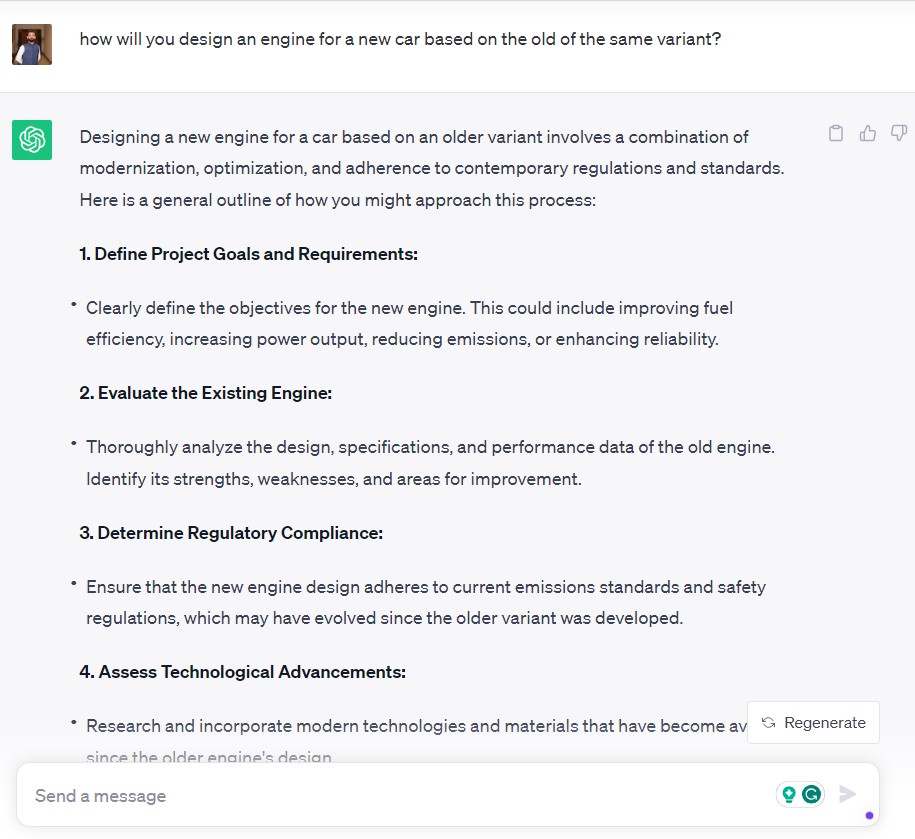
Predictive Maintenance
AI can assist mechanical engineers in predicting when equipment will fail and require maintenance. This can help engineers plan and schedule maintenance activities more effectively, reducing downtime and increasing productivity.
Quality Control
AI can assist mechanical engineers with quality control by analyzing data from sensors and identifying potential issues before they become major problems. This can help engineers identify and correct issues early, reducing costs and increasing efficiency.
What Areas of Mechanical Engineering Can ChatGPT Replace?
I believe that while ChatGPT can provide great assistance to mechanical engineers, it cannot fully replace them in all areas. However, there are certain areas where AI can be particularly effective. Let’s take a closer look at some of these areas:
Repetitive and Monotonous Tasks
ChatGPT can replace mechanical engineers in repetitive and monotonous tasks. These tasks can be time-consuming and often require a high level of precision. AI can help automate these tasks, allowing engineers to focus on more complex and creative tasks.
For example, imagine a mechanical engineer tasked with performing quality control checks on a production line. Using AI like ChatGPT, the engineer could automate the process of checking for defects or deviations in product specifications.
This can help save time and improve accuracy. We provided ChatGPT with the specifications of a Car and then asked it to write the deviations from another variant of the same:
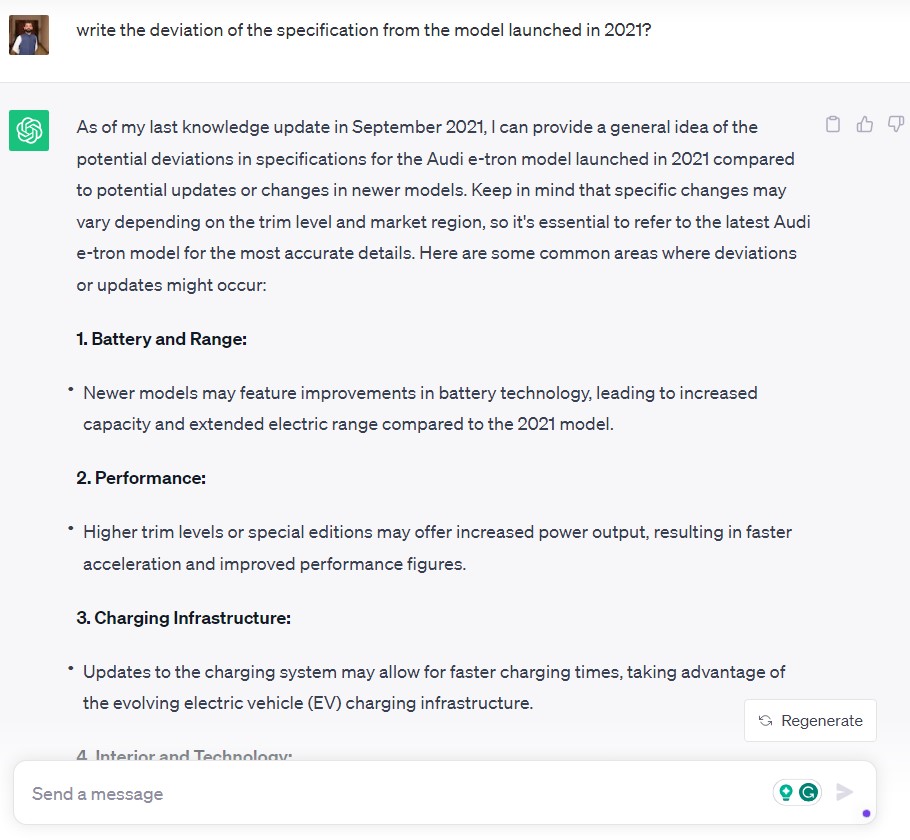
Data Analysis
ChatGPT can replace mechanical engineers in data analysis. With the growth of the Internet of Things (IoT), mechanical engineers are generating more and more data from sensors and other sources. AI can help analyze this data and provide insights that can help engineers make informed decisions.
For example, imagine a mechanical engineer tasked with optimizing the performance of a wind turbine. Using AI like ChatGPT, the engineer could analyze data from sensors on the turbine and identify patterns or anomalies in the data.
This can help the engineer optimize the performance of the turbine and reduce maintenance costs.
Routine Design Tasks
ChatGPT also assists with routine design tasks, i.e., generating 3D models, drafting, and performing simulations. AI can help automate these tasks, allowing engineers to focus on more complex and creative tasks. For example, imagine a mechanical engineer tasked with designing a complex machine.
Using AI like ChatGPT, the engineer could automate the process of generating 3D models and simulations. This can help save time and improve accuracy, allowing the engineer to focus on more complex aspects of the design.
What Areas of Mechanical Engineering Will ChatGPT Struggle to Replace?
ChatGPT can be useful in assisting mechanical engineers. However, there are certain areas where it may struggle to replace them. Let’s take a closer look at some of these areas:
Hands-On Tasks
One area where ChatGPT will struggle to replace mechanical engineers is in hands-on tasks. There are many mechanical engineering tasks that require a physical presence and a hands-on approach, such as assembly, maintenance, and repair.
While ChatGPT can assist in providing instructions or identifying issues, it cannot replace the physical skills and expertise of a trained mechanical engineer.
For example, imagine a mechanical engineer tasked with performing maintenance on a complex piece of machinery. While ChatGPT can provide instructions and identify potential issues, it cannot replace the mechanical engineer’s ability to inspect and diagnose the machinery physically.
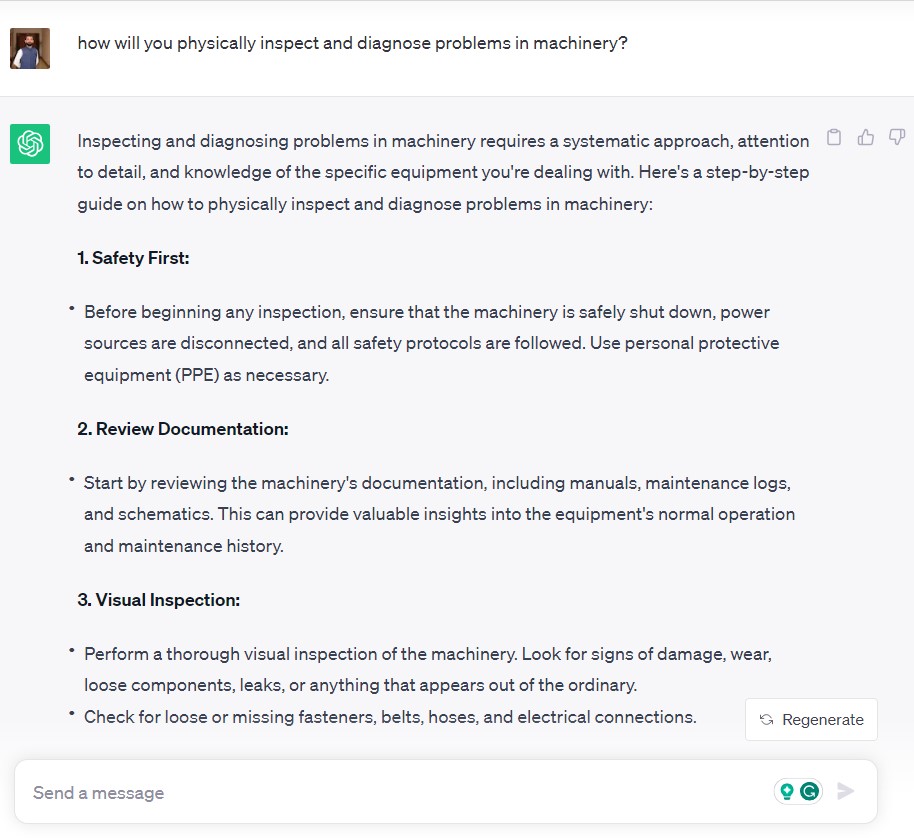
Complex Design Tasks
While AI can assist with routine design tasks, more complex design tasks require a high level of creativity and expertise. These tasks often involve taking into account a variety of factors, such as material properties, manufacturing processes, and cost constraints.
For example, imagine a mechanical engineer tasked with designing a new type of aircraft engine. While ChatGPT can assist in generating 3D models and simulations, it cannot replace the mechanical engineer’s ability to take into account all the different factors and make informed design decisions.
Decision-Making Tasks
ChatGPT may struggle to replace mechanical engineers in decision-making tasks. While AI can provide data analysis and insights, it cannot replace the ability of mechanical engineers to make informed decisions based on their expertise and experience.
Mechanical engineers often have to make decisions that take into account a variety of factors, such as safety, reliability, and cost.
For example, imagine a mechanical engineer tasked with selecting a material for a new product. While ChatGPT can provide data on the material properties and cost, it cannot replace the mechanical engineer’s ability to make an informed decision based on their expertise and experience.
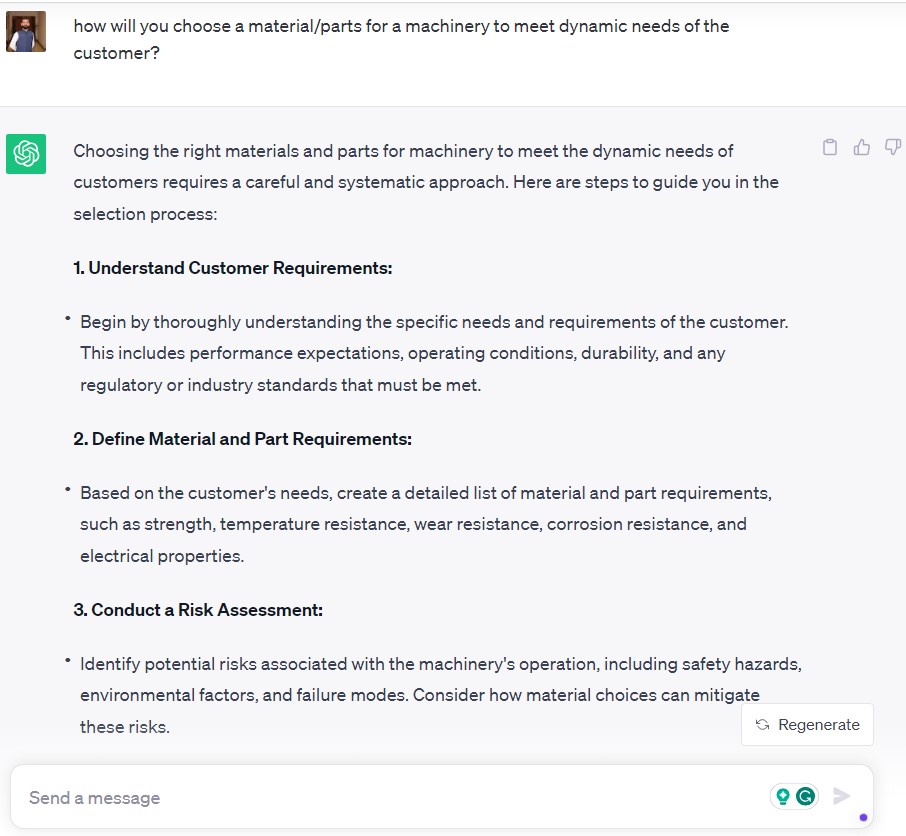
FAQs
Will ChatGPT 4 Replace Mechanical Engineering?
No, ChatGPT will not replace mechanical engineering. While AI can assist in certain tasks, such as design and analysis, mechanical engineering still requires a hands-on approach and expertise that cannot be replaced by AI.
Can ChatGPT Solve Mechanical Engineering Problems?
ChatGPT can assist in solving mechanical engineering problems by providing insights and analysis. However, it cannot replace the physical skills and expertise of a trained mechanical engineer.
Will Mechanical Engineering Be Replaced by AI?
No, mechanical engineering will not be replaced by AI. While AI can assist in certain tasks, mechanical engineering still requires a human touch and expertise.
Which Engineering Will Not Be Replaced by AI?
All engineering fields will continue to require human expertise and creativity. AI can assist in certain tasks, but it cannot replace the human touch and decision-making skills that are necessary in engineering.
Will Robots Replace Mechanical Engineers?
No, robots will not replace mechanical engineers. While robots can assist in certain tasks, such as assembly and manufacturing, they cannot replace the expertise and decision-making skills of a trained mechanical engineer.